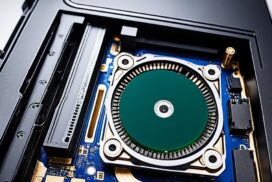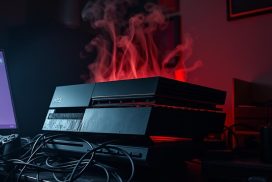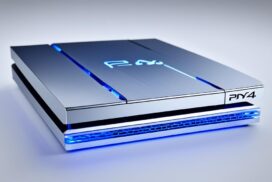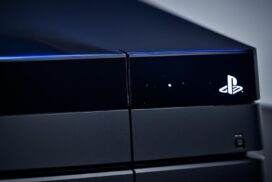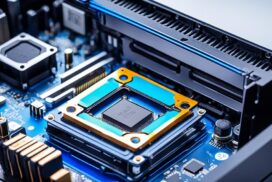Solving the Problem: How to Fix PS4 Pro Fan Noise
Many gamers face loud fan noise from their console, especially during intense gameplay. Titles like God of War push the system, causing the cooling system to work harder. This issue affects performance and can shorten the console’s lifespan if ignored.
Simple fixes, like cleaning dust buildup with compressed air, often help. For those considering an upgrade, the PS5 offers a quieter alternative. However, older PS4 Pro models may still struggle due to design limitations.
This guide covers practical steps to reduce noise, from quick maintenance to deeper repairs. Regular care, like cleaning vents monthly, keeps airflow optimal. Let’s explore the best ways to restore peace to your gaming sessions.
Common Causes of PS4 Pro Fan Noise
Excessive sound from gaming consoles often stems from preventable issues. While some noise is normal during intense gameplay, persistent loudness signals deeper problems. Three main factors contribute to this disruption.
Dust Buildup in Vents and Internal Components
Dust accumulation blocks vents and coats internal components, forcing the fan to overcompensate. Alley_Cat’s attempt to clean side vents temporarily reduced sound but missed deeper debris. For severe cases, like Henryski’s “encrusted junk,” full disassembly may be needed.
Overheating Due to Poor Ventilation
Confined spaces or obstructed airflow trigger overheating. Later PS4 Pro models improved cooling designs, but early units struggle. As Henryski noted, the Xbox Scorpio runs quieter under similar loads, highlighting Sony’s initial design flaws.
Faulty or Aging Fan Hardware
Worn bearings or degraded components amplify sound. Early adopters report “aircraft taking off” levels of noise, often requiring fan replacements. Normal operational sounds are milder, like consistent humming.
| Cause | Impact | Solution |
|---|---|---|
| Dust in vents | Restricted airflow | Compressed air cleaning |
| Overheating | Increased fan speed | Relocate console |
| Aging fan | Grinding sounds | Hardware replacement |
How to Fix PS4 Pro Fan Noise: Quick Fixes
Proper ventilation directly impacts system acoustics during gameplay. Simple adjustments often yield noticeable improvements without technical expertise. These methods preserve warranty coverage while enhancing performance.
Maintaining External Components
Dust accumulation around vents forces cooling systems to overwork. Alley_Cat’s vacuum approach works for surface debris, but compressed air reaches deeper areas. Follow these steps for safe cleaning:
- Power off and unplug the console
- Hold cans upright to prevent liquid discharge
- Use short bursts at 45-degree angles
- Rotate the unit to access all vent openings
“Monthly maintenance prevents 80% of airflow issues without disassembly.”
Optimizing Physical Placement
Environmental factors significantly affect thermal performance. Ideal positioning follows these guidelines:
- Minimum 6-inch clearance on all sides
- Avoid enclosed entertainment centers
- Keep away from heat-producing appliances
- Test vertical vs horizontal orientation
| Method | Tools Needed | Time Required |
|---|---|---|
| Vent cleaning | Compressed air, brush | 15 minutes |
| Repositioning | None | 5 minutes |
| Noise testing | Decibel meter app | 10 minutes |
Noticeable changes typically appear within 48 hours of implementation. Persistent issues may require advanced solutions covered in later sections.
Advanced Repairs for Persistent Noise
Persistent sound issues often require technical interventions beyond surface cleaning. When dust removal and repositioning don’t help, these advanced methods restore quiet operation.
Replacing the Internal Cooling Fan
Worn-out fans cause grinding or whirring sounds. Robert_h recommends Nidec replacements (£22 at Console Parts 4 U) for reliable cooling. OEM models fit perfectly, while third-party options like Noctua may need modifications.
Tools needed:
- Torx T8/T9 security screwdrivers
- Anti-static mat
- Plastic spudgers
Applying New Thermal Paste to the CPU
Old paste dries out, reducing heat transfer. During disassembly, clean the heatsink and apply a pea-sized drop of high-quality paste (e.g., Arctic MX-4). Ensure even spread for optimal contact.
Note: Avoid over-tightening screws, which can warp the motherboard.
Upgrading to an SSD for Reduced Heat Output
SSDs generate less heat than HDDs, easing cooling demands. Robert_h’s 1TB hybrid SSHD offered a budget-friendly middle ground. Full SSDs boost speed and lower temperatures long-term.
| Upgrade | Impact | Cost Estimate |
|---|---|---|
| Fan replacement | Eliminates grinding | $20–$40 |
| Thermal paste | Lowers CPU temps | $5–$15 |
| SSD upgrade | Slower heat buildup | $50–$150 |
“iFixit guides simplify fan swaps—just work methodically to avoid cable damage.”
Conclusion
Keeping your console running smoothly requires consistent care. Simple steps like dust removal and proper placement can drastically cut down unwanted sound. For persistent issues, hardware upgrades like fan replacements or SSD installations offer lasting relief.
Older models may still struggle due to design limits. Sony’s revised versions and the PS5 provide quieter alternatives with backward compatibility. Until an upgrade, regular maintenance extends your system’s life.
Trusted parts like Nidec fans and quality thermal paste improve performance. For complex repairs, follow iFixit guides or consult professionals. A well-maintained console ensures quieter, longer-lasting gameplay.
FAQ
Why is my PS4 Pro making loud fan noises?
Excessive noise often stems from dust clogging the vents, overheating from poor airflow, or a worn-out cooling fan. Regular maintenance helps prevent these issues.
Can I clean the fan without opening the console?
Yes. Use compressed air to blow dust out of the vents. Avoid inserting objects inside, as this could damage internal components.
Does repositioning the console reduce fan noise?
Absolutely. Place the system in an open area with at least 4 inches of clearance on all sides. This ensures proper ventilation and cooling efficiency.
When should I replace the cooling fan?
If cleaning doesn’t resolve the noise, the fan may be faulty. Persistent grinding or rattling sounds indicate it’s time for a replacement.
Will applying new thermal paste help?
Yes. Over time, thermal paste dries out, reducing heat transfer. Reapplying it improves cooling and can lower fan speed.
Does upgrading to an SSD reduce noise?
SSDs generate less heat than HDDs, easing the cooling system’s workload. This can lead to quieter operation and faster load times.

